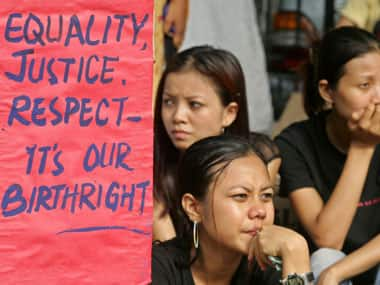by Sharon Fernandes There has been no easy way to introduce yourself in a market place in Delhi. Most conversations for someone who looks a tad “different” in a crowded Punjabi market in west Delhi at Rajendra Nagar or South Delhi at Sarojini Nagar or Lajpat Nagar, can quickly get awkward. “Aap ke yaahan toh log bohot coffee pete hain?" was the first question that was thrown at me by a shop vendor at Rajendra Nagar. This was 2006, I had recently moved into the neighbourhood, and was hoping to ask the grocer if he would deliver goods home. I asked him why he asked me that question. “Aap South se hain na?” was his rather amused reply. Clearly he could see something on my forehead that I had missed. Maybe i was wearing my muffler all wrong for the Delhi winter. Maybe I didn’t know how to say, “Ek packet coffee, please?” But he grinned, and tried his level best to put me out of my misery. “Aap ke colour se pata chala.” I instantly needed something more stronger than coffee to swallow how quickly I was stereotyped, labelled and sent packing with a sachet of ‘instant coffee’ in my hand. I kept grumbling to myself, maybe I should have called him on his stereotyping in that moment. This event was only the first of the several comments and questions, one has to handle from people who are just being “welcoming”. A neighbour at Hauz Khas asked if we had met the other people who were like us, living on the third floor. “They are also Malayalees. Aap ke tarah baat karte hain aur gentle hain.” [caption id=“attachment_1371487” align=“alignleft” width=“380”]  Students from north east India in Delhi. Reuters.[/caption] And if we thought only middleclass housewives and grocers had a problem in maintaining social decorum, erudite, urban folk in the Delhi Metro will ask you questions that have nothing to do with the way you conduct yourself in a train. “Aap ko Tamil samajh mein aati hai?” “I said I couldn’t, but why did they ask me that? If I said “I am from Goa” that always got the other cultural stereotype going. “Bahut achhi jaga hai, wahan alcohol bahut sasta hai, sab chalta hai. Sab peete hain.” And then of course, it is expected that I have come from a land of loose morals and alcoholics. Delhi has a huge number of expats, students, workers from all over the world, who live and call it home. But somehow the city finds itself surprised and uncomfortable acknowledging and accepting “outsiders.” The incidents at Khirki and Lajpat Nagar highlight that it is not just issues like corruption or power tariffs that remain unresolved. This idea of distinguishing among people on the basis of linguistic, religious, ethnic and regional origins can prove to be fatal. African and African American students in India have suffered racism for decades, thanks to our obsession with fair skin. I have seen autowallahs snub and refuse African students a ride. And it doesn’t stop there. The group of racists, secure in their herd mentality, will snigger, as a single taunting body. And while we Dravidians, or people who are “wheatish” are not made to feel completely unwelcome, there are always questioning looks of from our “padosis” when we don’t meet the typical north Indian stereotypes. Nido Taniam from Arunachal suffered the most violent manifestation of this urge to stereotype and label people that the city suffers from. The middle and lower middle class Delhiite looks at a culture or race that he has not encountered or fails to understand as something suspect that needs to be squashed instantly. Violence provides the easy and quick answer for people in the city to express themselves. It is no surprise that people have been reportedly killed for asking for extra dal, running away with Rs 50 or even worse, parking in the wrong spot. I found love, married and had a child in this city, but I doubt I would want to bring up my child here, in a place that doesn’t think twice before it identifies people with “south wale” “chinki” and other stereotypes. A place where it doesn’t matter how rich or poor you are, will still slot a person according to ethnicity. Delhi will have to try hard to wipe out the label it now bears – “a terrible place to be yourself".
Delhi has a huge number of expats, students, workers from all over the world, who live and call it home. But somehow the city finds itself surprised and uncomfortable acknowledging and accepting “outsiders" - whether they are from Arunachal, Nigeria or Chennai.
Advertisement
End of Article
Written by FP Archives
see more


)
)
)
)
)
)
)
)
)



